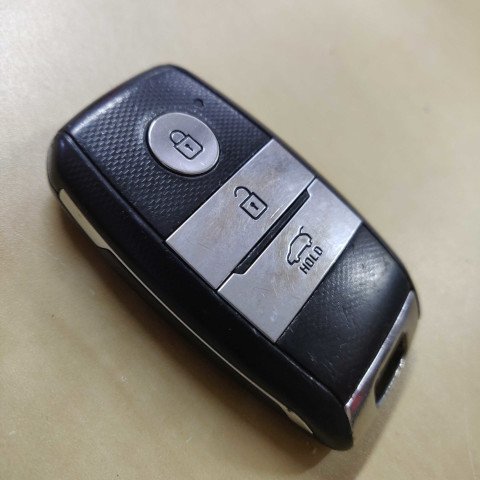Car crime, car theft, keyless theft; all on the increase according to a number of sources, including the Office for National Statistics, LV=General Insurance, and Tracker, a specialised car security company.
It’s easy to throw simple numbers around – the ONS (Office for National Statistics) tells us that just until March this year, there were 114,656 incidents of ‘theft or unauthorised taking of a motor vehicle’, that 8% more cars have been stolen in the last year, or that there has been over 800,000 instances of criminal damage to cars.
But while that gives a very broad overview, it doesn’t really impact. Tracker have some further insight; in 2018, around 88% of stolen vehicles fitted with one of their devices were stolen without the use of keys, up from 80% in 2017, and again from the 60% in 2016.
LV=General Insurance said that its claims data suggests a direct link between car thefts, and the rise of technology, in particular, smart devices.

Simple theft
A keyless entry or keyless start system seems like a great idea when you’re approaching your car with hands full, or when your key is buried at the bottom of a bag, or even when it’s just tucked in your pocket and your juggling a hundred different things. Certainly it will never revolutionise the world, but it does make it that little bit easier.
Unfortunately, not only does it make your life easier, but also the criminal’s looking to relieve you of your car. And truth be told, it’s simple for them to do so, with some off-the-shelf technology that can be bought for just a few pounds – this doesn’t require a contact book full of criminal masterminds, nor the investment of a large budget.
Technology
The reason why keyless theft is so popular, and so easy, is simple – there’s no need to enter the home of the keyholder, which lessens the charge should they be caught, and there’s minimal risk involved, aside from being close enough to the house to try and pick up the electronic signal from the key. It really is that easy.
Once the signal is located, it’s a matter of relaying the signal to the car and gaining entry or making off. Less than a minute, no aggravation, nothing physical, and no danger to the householder (unless they catch the criminal in the act). In most cases, the owner of the car won’t know anything about it until it’s too late.
Don’t be a statistic
Preventing car theft is always difficult, even more so if you’ve been targeted by a professional gang, but there are some simple steps that you can take, to help you becoming just another crime statistic.
Faraday bags
A Faraday bag is a soft pouch that blocks any signals from the keyfob itself, which means the thieves won’t be able to track the signal and relay it to the car, no matter where the fob is located in the house.
Safe spot
Failing that, or while you wait on delivery of your Faraday bag, you should try and locate a safe spot for your fob, as far away from doors and windows as possible, the idea being to make it as difficult as possible for the thieves to locate the signal.
Car security
In the event that a thief does manage to gain entry to your vehicle, all is not lost; the use of steering wheels locks does tend to deter all but the most determined thieves, and in many cases, the visual deterrent alone is enough to send them elsewhere.
Traditional security
While it’s unlikely that an opportunistic car thief armed with a relay device is looking to break into your home, investing in some traditional security will help to prevent them should they take that route, and of course, give you some peace of mind.
We’ve teamed up with the leading security experts at ERA to offer you an unrivalled discount on a wide range of products, from plug-in alarms through to HD security cameras.
The discount codes are included on the website, remember to put them in at the checkout!
Deterrent
While you wouldn’t necessarily wish ill-fortune on your neighbours, the simplest course of action is to make your car look less desirable than another, or more trouble; the choice between getting through a steering lock and physical immobiliser, all the while being lit up like it’s daytime or finding another car is usually more than enough to make a thief think twice.
You’ll never stop professional thieves if they’re determined to have your car, but you can make life difficult for them, and hopefully your neighbour doesn’t feel the same.
Should more be done by the car industry to stop car thieves? Have you had a car stolen? How did the insurance claim go? Let us know in the comments.



Good post. There are other ways to block the signal being read so I feel you should expand the article to disclose this.
Go on Joe, impress us all with your superior knowledge…..
Wrap the fob in tin foil. Simple, signal blocked
Or Keep them in a tin box
Or put them in a poly bag in the fridge.
Mercedes used to have immobilisers fitted from the factory. Have they stopped this now? I know Caddies and Lincolns just being in the car is enough to start it. Perhaps a coded imobiliser is the answer as with Bank Cards where the pin changes each time? Other option is move up to a Much much higher frequency. When you get into 5G millimeter wave and above, walls start of block signals so using an old coffee or food tin in the kitchen would block everything and not cost you a penny. You could keep all car keys in same tin. Of course if you continue to keep the spare under a flowerpot make sure it is a metal one, perhaps a watering can?
Mercedes still does have an immoboliser in the car – so do most other car manufacturers – but the key’s signal opens up the immobiliser even when it is transmitted from elsewhere.
This issue have been around for a while and it is extremely simple to fix via well established security which existed for many years. Wheel locks are effective deterrent, but bulky, ugly and retarded.
From early days of car security systems there was option of immobiliser. There were “secret” switches, secondary remotes and noways-days key-less tokens (heck I had one when I was in the school ~2007, fitted into 1994 Mazda MX3). It costs like £100 install respectable brand and it is 99% effective (I could find them as cheap as $12, but probably I would not trust that to protect my car).
The key-less system works on the same principle as immobiliser (effectively the engine immobilised until it senses the key inside), however it is easy to know what frequency needs to be amplified to steal the car. Unlike car fitted key-less immobiliser, 3rd party ones doesn’t have “badge on the boot” so thief would never know what other frequencies have to be amplified. Furthermore, now there are multi-channel immobilisers (I say now… aforementioned immobiliser in MX-3 had 3 channels and it was 2000s technology, I have seen 16, 64, 256 channels being sold now). This mean that potential thief would need to simultaneous amplify car own immobiliser and on to of that figure out how many more channels aftermarket immobiliser have and amplify all 4, 17, 65, or 257 channels at once! I am not aware that any of the amplifiers used by thief could amplify multiple channels (maybe they could I am not thief), but what I know for sure it would take hours to figure out all channels and all frequencies.
Finally, it is very simple and practical – just a small token which you can have attached to your key, you don’t even need to press any additional buttons. You use your normal key-less for to enter the car, but it won’t start until immobiliser token is present.
Apparently, putting the key fob in a metal box stops the signal
I use a stop lock and have a tracker fitted. You would think Insurance Companies would give a discount for this but mine (RSA) dont! Why not?
Agreed – I have an Autolock, which locks the applied handbrake and gear leaver into first/reverse. No chance of moving the car! No discount for this.
Couldn’t this problem be very simply solved by having vehicle manufacturers cease producing them with this entirely unnecessary feature? What is wrong with using a key in the ignition lock for goodness sake – you know, just like we have done for years? Progress for the sake of it is not always a good thing.
A Faraday bag is a great start but don’t expect car manufacturers to rush to correct this security issue – they don’t mind selling another new car to an insurance company!
Why don’t the insurance companies simply charge extra for cars fitted with keyless entry? An extra 25% say, should be enough to cover the extra costs resulting from thefts of the vehicles fitted with this unnecessary fad.. It would also deter some people from buying them in the first place.
Really, higher insurance that is already too high.
The responsibility is with the manufacturers, keep the keyless entry but increase the security on them as well
Should be simple for manufacturer to build-in that once the car is parked and locked at owners home, the key fob stop emitting signals after a certain period of time such a 5 minutes. This way the thief with the gadgets cannot access any signal coming from the key-fob, I believe certain Ford models already have this type of security on several models.
Car makers should put a ‘on/off’ switch on their keys.
They have. It is where you press a button to open the car and a separate button to lock it. Keyless owners do not want the hassle of going into their pocket for a key to press a button so your idea is a non-starter.
Surley with today’s tech a finger print pad built in to the drivers door would work if I can sign in to my phone with my finger print shuldnt be that dificult.
I keep mine key in the fridge, this does not seem to be mentioned in the article. I
You risk getting moisture on the delicate electronic components on the internals of your keyfob. Just like condensation when there is a difference in temperature. You risk reducing the life dramatically of your fob this way. Also think about the cost of a fob. It varies but can cost quite a few hundred pounds to a thousand or so. Is it really worth putting your key in the fridge now? A faraday bag only costs a tenner. Seriously when you buy a car for several thousands of pounds why skimp out on a tenner?!
My key fob accidentally went for a spin in the washing machine and got significantly more than just condensation on its components. All it needed was taking apart and drying it all off. Works perfectly again. I’m not suggesting that it is something to be done regularly mind!
Place in microwave instead of fridge, bone dry and surrounded by metal frame.
As good as any faraday bag.
I have noticed no on has mentioned about every day tin foil kept in kitchen draws..If you wrap up the key in foil or line the inside of a box with foil it does the same job…..
Ah, the convenience of these handy new key fobs!!!
Even if a person(s) gets caught, they have nothing to fear from the law as all they will get is a smack on the waist.
That would be a physical assault. Sue the police!
A very simple method is, when caught stealing a veichle, instead of slapping there wrist and releasing them! Get them on a 2 year scheme where they go around, no cost to taxpayer, filling all the pot holes in, if they try to cop out and not turn up for work, take them straight to jail, seize all there assets sell them to keep the cost down of providing these schemes. And make them go back out filling pot holes in and this could be done using a private security company!
Making only a good impact on road services
Remember this is the UK, we don’t punish anyone anymore, all down to the PC brigade.
So, the article doesn’t state this explicitly, but I infer that these fobs are radiating a signal *all the time*, even if you have not pressed the unlock doors button?
The onus should be placed on the CAR MANUFACTURERS!
It is easy and the technology exists and is cheap.
Receivers can measure the SIGNAL TIME which is normally from the owner outside the car to the car. If the signal time exceeds a certain time the system will assume the key is not outside the car and keep the car locked.
How about having to enter a PIN number on the infotainment screen, just make sure you keep the screen clean of fingerprints
The insurance broker that I use provided a Defender Faraday pouch to anyone who was willing to go into their office and collect it. An idea that could be done by all brokers.
Many years ago a friend in Johannesburg had an immobiliser which didn’t stop anybody from driving his car. Instead, after about a mile, it would close the windows, lock the doors, disable all the internal door handles, window controls etc, and switch off the ignition.
Then it was simply a matter of waiting for somebody to call the police to report a car causing an obstruction.
With today’s technology, that could be updated to have the device itself call the police, and give them a precise position, GPS-derived.
Buy a car that does not have a keyless system as mine does not SIMPLE